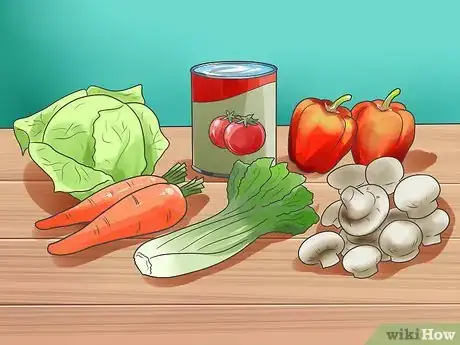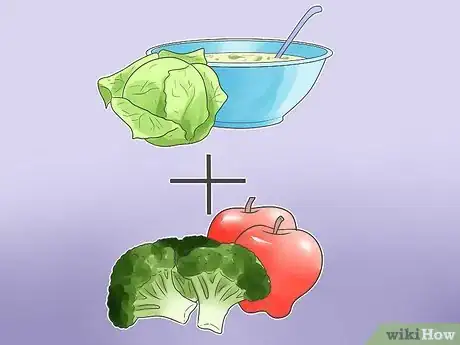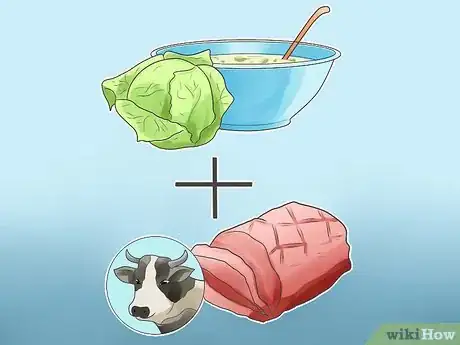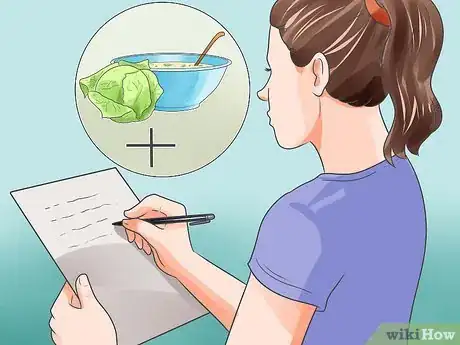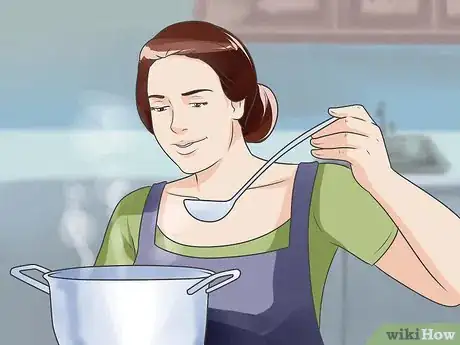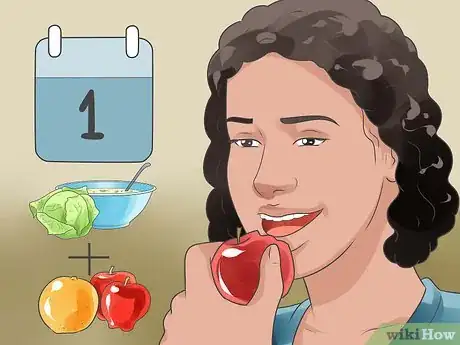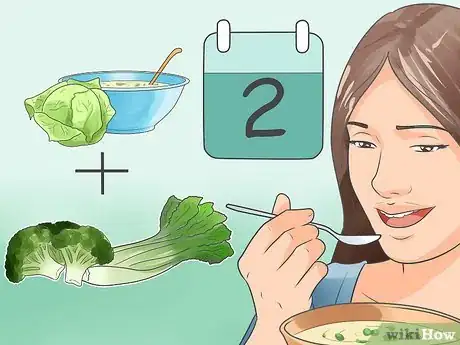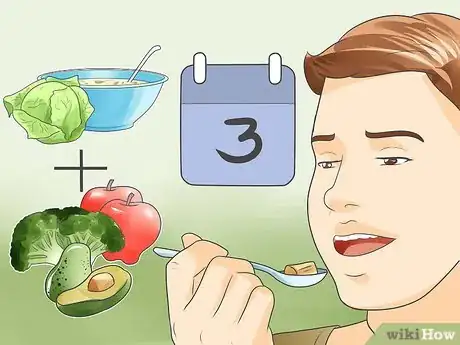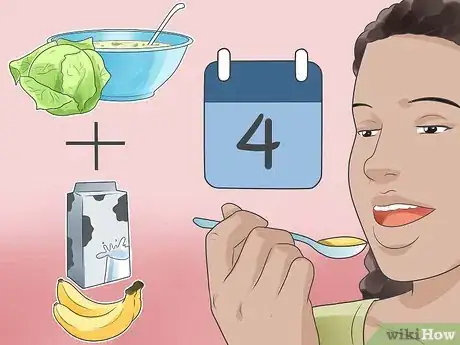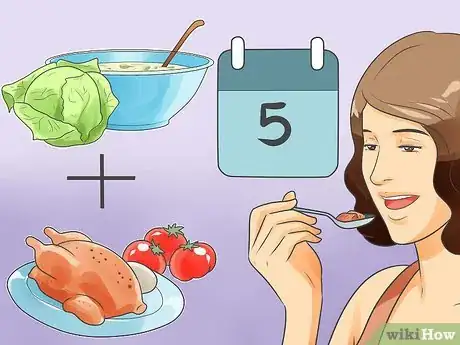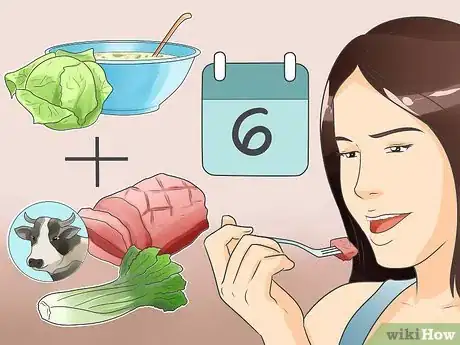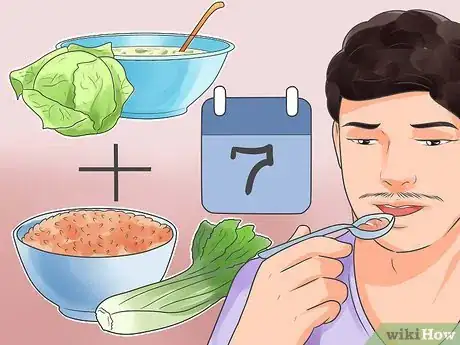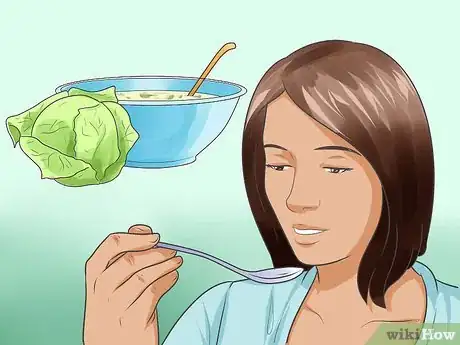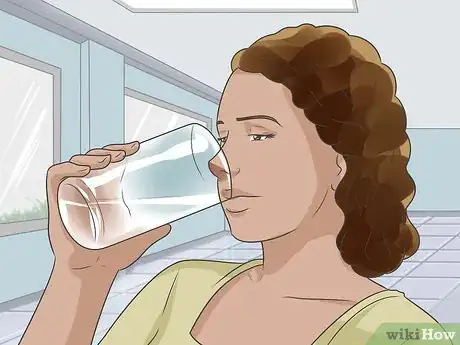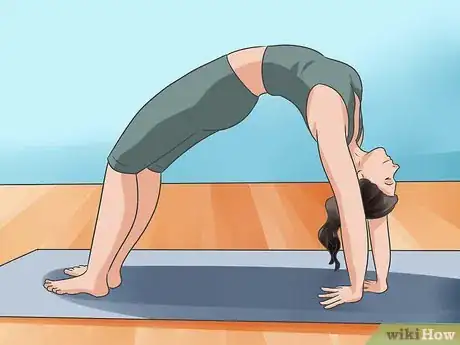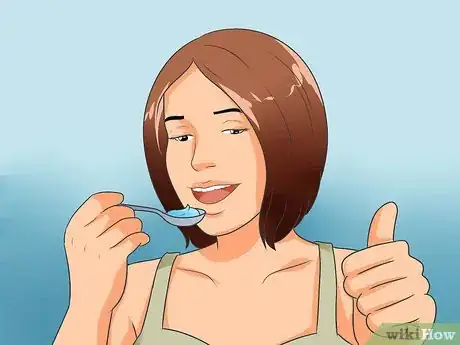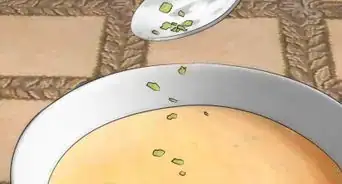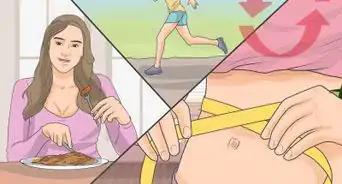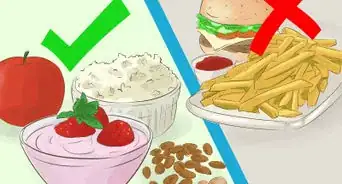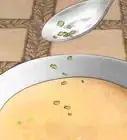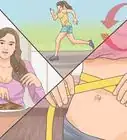This article was co-authored by Lisa Jubilee. Lisa Jubilee is a Certified Dietician-Nutritionist and the Co-Founder of Living Proof Nutrition Strength Pilates in New York City. With over 20 years of experience, she specializes in sustainable weight loss and disease prevention. She earned a Masters in Nutrition and Dietetics from New York University and a BS in Chemistry, Foods, and Nutrition from Rutgers University. She also published an e-book, Self Care = Health Care: A Health Empowerment Protocol From a Nutritionist’s Perspective. She has been ranked as one of the Best Nutritionists in New York City by Expertise.com since 2017.
There are 8 references cited in this article, which can be found at the bottom of the page.
wikiHow marks an article as reader-approved once it receives enough positive feedback. In this case, several readers have written to tell us that this article was helpful to them, earning it our reader-approved status.
This article has been viewed 323,416 times.
The cabbage soup diet requires you eat large amounts of cabbage soup for a week. During this week you can also eat some fruits and vegetables, chicken, beef and brown rice. Proponents say it is a good way to lose a few pounds very quickly. It will certainly drastically lower your calorie intake, but it may be water weight or lean tissue rather than fat that you are losing. It is very difficult to burn that many fat calories in a such a short time. If you do decide to try the diet, you shouldn't extend it beyond one week. The lack of complex carbohydrates, vitamins, minerals and protein may leave you feeling tired and weak. Remember that long-term weight loss requires lasting changes to your eating and exercise habits.[1]
Ingredients
- 6 green onions, chopped
- 2 green peppers, diced
- 2 cans of tomatoes (diced or whole)
- 250g mushrooms, sliced
- 1 bunch celery, chopped
- 1/2 head cabbage, chopped
- 3 carrots, sliced
-
1 or 2 cubes bouillon/vegetable stock (optional), plus salt and pepper to season.
- For added flavour: Cayenne pepper, curry powder, mixed herbs or any other seasoning.[2]
Steps
Preparing for the Diet
-
1Get the ingredients for the soup. If you are going to try out the cabbage soup diet you need to be able to make cabbage soup. Stock up on all the ingredients you will need. If you are going to stick to this diet all week, you will need to make a lot of cabbage soup. It's simple to make and you can start by making a big pot, which you can store in the fridge or even to freeze to keep fresh.
-
2Stock up on other fruit and veg. With the cabbage soup diet you eat the soup as your main meals during the day, but you also add in some fruit and other vegetables on fixed days. Before you start on the diet ensure you have a good supply of leafy greens and mixed fruits at home.
- Broccoli and spinach are good choice which can add some iron to your diet.
- Avoid starchy vegetables such as dry beans or sweetcorn.[3]
Advertisement -
3Buy the meat. On certain days you will add some meat to your diet, typically beef one day and chicken another day. Buy one or two 300g packets of lean beef mince and a packet of chicken breasts. You will eat the meat on day 5 and day 6 of your diet, so be sure it will still be good to eat by then.[4]
- Check the best before dates on the packet, and put off buying until later in the week if necessary.
- Always look for lean meat.
-
4Write up your diet plan. Before you start the diet it can be helpful to draw up your food schedule and pin it up on the fridge or somewhere in the kitchen. The constant is cabbage soup which is supplemented with extras on different days. Write up the schedule detailed below.
- The cabbage diet should only be followed for 7 days and allows you to eat an unlimited amount of cabbage during this 1 week plan.
-
5Prepare the soup. The soup is easy to prepare. First of all you need to chop up all the vegetables and lightly fry them in some olive oil in a big pot. Put the chopped onions in first and allow them to begin to become translucent before adding the green pepper and cabbage. Stir them a little in the pot so they begin to wilt. Then add the chopped carrots, mushrooms and celery. Add some seasoning at this point and stir well.[5]
- If you are using tinned tomatoes, pour these into the pot.
- Add a covering of water and bring to the boil.
- Consider adding some bouillon or a stock cube for flavour.
- Allow it to simmer for a couple of hours.
- Taste and season when it has reduced to the consistency you like.
Trying the Cabbage Soup Diet
-
1Eat right on day one. It's important to get off to a good start. On day one you should eat cabbage soup as your main meal throughout the day. Add some spice and seasoning to give it a bit of a kick; you are going to be eating a lot of it, and it would otherwise get boring. On day one you can add fruit to your diet.[6]
- Eat fruit throughout the day
- But don't eat bananas on day one.
- Stick with apples, oranges and other fruits.
-
2Add leafy vegetables on day two. Hopefully by the second day you won't be completely sick of eating cabbage soup already. Keep eating the soup for your main meals. Instead of adding fruit to your diet, on day two you should add some leafy greens either raw or cooked.
- For example you could boil or steam some broccoli or spinach.
- Have a baked potato with a little soup.[7]
- Don't eat any fruit.
-
3Have extra fruit and vegetables on day three. By day three you will be growing increasingly put off by the sight and smell of cabbage soup. Today you can supplement the soup with all sorts of fruits and vegetables. Fruits and vegetables are very low in calories so eat plenty of them to give yourself some different tastes.[8]
- Don't eat potatoes on this day.
- You should also avoid bananas on this day.
- All other fruit and veg are fine.
-
4Go for bananas and skimmed milk on day four. You have now reached the halfway point and the end is looming a little closer. On day four you will have a change and add bananas and skimmed milk to your diet. You keep eating the cabbage soup for your main meals, but eat some bananas and drink skimmed milk during the day.[9]
- Be sure to get skimmed or at least semi-skimmed milk.
- You might like to combine the bananas and milk for a basic milkshake.
-
5Add chicken and tomatoes on day five. Once you have reached day five you can add something with a bit more substance to your diet. Today you get to eat some meat and tomatoes. You can choose either chicken or lean beef. If you go for chicken, boil it skinless to cook it the healthiest way possible. Skinless chicken breast with sliced tomatoes made a good combination.[10]
- Eat up to six tomatoes.
- You can eat the tomatoes raw, or grill them. Don't fry them.
- You should still eat the soup at least once today.
- Be sure to drink 6-8 glasses of water on this day.
-
6Eat beef and vegetables on day six. On day six you will eat meat again. If you had chicken on day five, go for lean beef on day six. Combine lean beef with plenty of vegetables or salad. You should eat leafy greens with the beef, such as kale or spinach.[11]
- The beef and veg should supplement not replace the cabbage soup.
- Don't eat potatoes on this day.
- Try not to use too much oil when you cook the beef.
-
7Finish with brown rice and vegetables on day seven. Now you have reached the final day of the cabbage soup diet. You can celebrate by eating some brown rice and vegetables alongside your cabbage soup. Just one modest bowl of brown rice with leafy greens should be enough to complement your daily soup intake.[12]
- You can also drink some unsweetened fruit juices on this day.
- Juicing fruit at home will guarantee there is no added sugar and give you fresh delicious fruit juice.
- Don't continue the diet beyond seven days.
Making the Most of the Diet
-
1Stick to the diet. To get the greatest benefit from the cabbage soup diet you need to be able to stick to it for the full week. This is first and foremost a question of willpower and commitment, but there are things that you can do to help give yourself the best chance. Having a clear plan for your diet, with your meals organised in advance, will help you stick to it. Organisation and planning are crucial for any weight loss programme.[13]
- Any gaps in the plan or uncertainties about what you should be eating could easily lead to you slipping from the programme.
- Having a prominent and detailed meal plan will help you take control of the diet and track your progress.
-
2Don't forget liquid calories. If you are dieting you will be paying close attention to what you eat, but don't forget about the calories contained in what you drink. Alcoholic drinks in particular are loaded with calories and you would be undoing all your good work if you don't cut out the alcohol while you diet.
- This also applies for sugary soda drinks. You might not immediately associate what you drink with your weight, but it's a crucial element that you shouldn't overlook.[14]
- Drinking lots of water throughout will keep you hydrated as well as helping to control your appetite.
-
3Maintain your health while dieting. Undertaking the diet will result in you not getting proper nutrition for a week, so you may begin to feel tired and weak.[15] It's important that you take steps to maintain your overall health while you are dieting. One way to help you consume nutrients while sticking to the diet is to take a multivitamin tablet daily. This is a quick and easy way to help you maintain a reasonable intake of the nutrients you need to keep your body functioning well.
- Given the severity of the diet it is unlikely that you will have the energy to do strenuous exercise, but try to maintain a reasonable level of gentle physical activity.
- For example, go for a casual walk in the evening.
- If you feel too tired or lethargic then reconsider the diet and replace it with a more balanced approach to healthy eating and exercise.
-
4Keep positive during the diet. One of the elements of the diet that make it easier to stick to is its short duration. You might find it easier to stick to a severe diet for a week than a more balanced one for longer, although for long-term results a more balanced approach is far more beneficial. If you do find yourself struggling to stick to diet and the prospect of another bowl of cabbage soup is hard to take, try to stay positive.
- Visualise the end day getting closer all the time and tick off each mealtime with a flourish.
- It is an achievement to get to the end of the week so you should be proud of your willpower and commitment.
- Now to see lasting benefits adopt a balanced diet and take regular exercise.
Warnings
- This is a severe diet so you should talk to a doctor before embarking on it.⧼thumbs_response⧽
- Increased flatulence is a common side effect of the diet.⧼thumbs_response⧽
- Most of the weight that is lost is in water, not fat. Therefore, the weight loss will not be permanent.⧼thumbs_response⧽
- This is a short-term weight loss plan that will not bring long-term results.⧼thumbs_response⧽
Things You'll Need
- Vegetable knife
- Cooking pot
References
- ↑ http://www.mayoclinic.org/healthy-lifestyle/weight-loss/expert-answers/cabbage-soup-diet/faq-20058079
- ↑ http://www.marieclaire.co.uk/blogs/433629/cabbage-soup-diet.html
- ↑ http://www.aboutcabbagesoupdiet.com/
- ↑ http://www.aboutcabbagesoupdiet.com/
- ↑ https://www.cabbage-soup-diet.com/recipe/
- ↑ http://www.webmd.com/diet/cabbage-soup-diet?page=1
- ↑ http://www.marieclaire.co.uk/blogs/433629/cabbage-soup-diet.html
- ↑ http://www.aboutcabbagesoupdiet.com/
- ↑ http://www.webmd.com/diet/cabbage-soup-diet?page=1
- ↑ http://www.aboutcabbagesoupdiet.com/
- ↑ http://www.webmd.com/diet/cabbage-soup-diet?page=1
- ↑ http://www.weightlossresources.co.uk/logout/news_features/cabbage_soup_diet.htm
- ↑ http://www.nhs.uk/Tools/Documents/WEIGHT-LOSS-PACK/all-weeks.pdf
- ↑ http://www.webmd.com/diet/top-10-holiday-diet-tips-of-all-time
- ↑ http://www.mayoclinic.org/healthy-lifestyle/weight-loss/expert-answers/cabbage-soup-diet/faq-20058079
